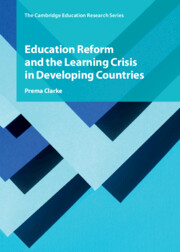Book contents
- Education Reform and the Learning Crisis in Developing Countries
- Education Reform and the Learning Crisis in Developing Countries
- Copyright page
- Contents
- Figures, Tables, and Boxes
- Acknowledgments
- Introduction
- 1 The Learning Crisis
- 2 Donor Programming in Education
- 3 Best Practice and Research in Education
- 4 Creating an Evidence Base for Learning
- Epilogue
- Index
- References
1 - The Learning Crisis
Published online by Cambridge University Press: 08 September 2022
- Education Reform and the Learning Crisis in Developing Countries
- Education Reform and the Learning Crisis in Developing Countries
- Copyright page
- Contents
- Figures, Tables, and Boxes
- Acknowledgments
- Introduction
- 1 The Learning Crisis
- 2 Donor Programming in Education
- 3 Best Practice and Research in Education
- 4 Creating an Evidence Base for Learning
- Epilogue
- Index
- References
Summary
This chapter introduces donor financing of education reform in developing countries and the global compacts in the sector. There is an assumption that learning was not part of these compacts and if only it were part of the discourse and learning was consistently measured, this crisis would not be upon us. However, the first global event in Jomtien, Thailand in 1990 included a significant and urgent obligation of the donor community to address learning. This concerted focus disappeared in following global events. Nonetheless, donors influenced by the shared passion for learning at Jomtein were consistently involved with measuring learning, helping to keep an eye on the unfolding learning deficit. Three examples are offered to illustrate this commitment – in a project (the Indian District Primary Education), across regions and during the primary early grades. These examples shine a spotlight on the tried and tested assessments of learning. In spite of donor focus on this important aspect of education, there is a learning crisis across developing countries.
Keywords
- Type
- Chapter
- Information
- Publisher: Cambridge University PressPrint publication year: 2022

